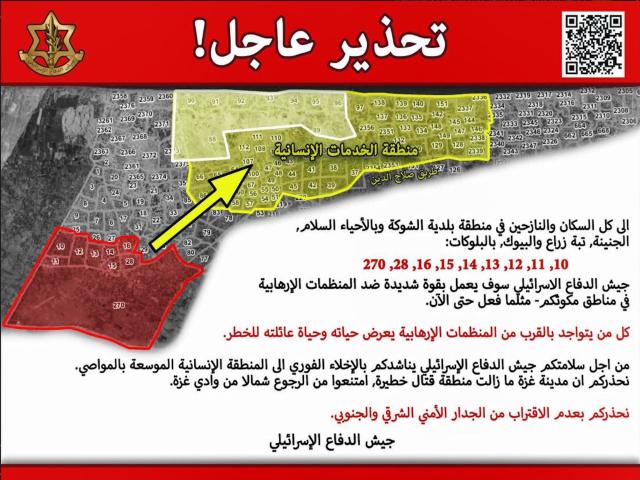In an escalating display of humanitarian concern, Israel's military sent out messages via SMS, email and radio to Palestinians in Gaza mandating an immediate evacuation in parts of eastern Rafah, urging local citizens and residents towards a designated humanitarian safe zone. The urgency in the air was palpable as IDF spokesperson Avichay Adraee implored, "For your ultimate safety, it is imperative that you move to the humanitarian zones at the checkpoints without delay." The warning is certain to tip off Hamas that an action in Rafah is imminent, however Israel has always affirmed it is interested in minimizing civilian casualties.
This clarion call reverberated just a day after the defense minister's bold declaration to troops stationed in Gaza, preparing them for imminent, severe military engagements. Israel has been transparent about its strategic intentions to deploy ground forces into Rafah, a crucial city near the Egyptian border. This city has become a reluctant sanctuary for over a million displaced Palestinians since Hamas escalated against Israel on October 7 and forced residents of Gaza to serve as human shields while the tens of thousands of militants from Hamas and Islamic Jihad hid underground.
The IDF released an infographic illustrating the evacuation of eastern Rafah to the humanitarian area, stating:
— Adam Albilya - אדם אלביליה (@AdamAlbilya) May 6, 2024
“We will continue pursuing Hamas everywhere until all the hostages that they’re holding in captivity are back home.” pic.twitter.com/iVGz8GP9TX
Israel's military targeted Rafah's Al-Shawka municipality and several other neighborhoods for evacuation, describing the operation as "temporarily limited in scope" and not an extensive clearance. Approximately 100,000 residents are impacted, provided with a minimum of several days to relocate, as per another IDF spokesperson's guidance. The area encompasses the Rafah crossing with Egypt and the Kerem Shalom crossing with Israel. The area is strategic as it allows Israel a secure staging area where it can monitor Palestinian ambulances being evacuated to Egyptian hospitals to ensure militant leaders and hostages are not smuggled out of the enclave.
To date, the Israeli onslaught in Gaza since the ground invasion began after the brutal October 7 attack by Hamas has left vast tracts of the region in ruins, with countless individuals forced into repeated displacement. The IDF, while doing its utmost to ensure new humanitarian safe zones are constructed has refrained from guaranteeing that the new refuge areas would be exempt from future offensives.
RAFAH EVACUATION
— Open Source Intel (@Osint613) May 6, 2024
The IDF leaflets distributed come in two types:
- Red: Urging for an immediate evacuation. Get out now!
- Blue: Detailing the expansion of the humanitarian zone. pic.twitter.com/DLdOmgfpg5
Amid international uproar and warnings from various global entities about the absence of any refuge within Gaza, the prospective invasion of Rafah by Israeli forces looms ominously, threatening to intensify the hardships and casualties among the already suffering Palestinian populace. Hamas has not allowed agencies to operate autonomously in the areas of the Strip that it held, and often has used safe zones set up by agencies like the UN's UNRWA to launch rockets at Israel, adding to the complexity of Israel's mission to eradicate the terror group.
Further exacerbating tensions, Israel's defense minister, Yoav Galant, candidly told his troops to brace for rigorous actions not only in Rafah but across the Gaza Strip, attributing the heightened military readiness to Hamas's persistent refusal to negotiate the release of hostages and agree to a ceasefire. This revelation came as a Hamas delegation departed Egypt, leaving behind a trail of fruitless negotiations. Hamas has refused to accept any deal that does not end the war, but until now has refused to offer the safe return of the remaining hostages or even its unconditional surrender. Some analysts have speculated recently that Israel would have probably accepted Hamas's offer to disarm and allow an international force in Gaza to oversee the dismantling of the terror network, which is another thing Hamas has not offered.
The urgency of the situation escalated after Israel was forced to close the Kerem Shalom border crossing, a critical conduit for humanitarian aid, following a lethal rocket attack that claimed the lives of four IDF soldiers and critically wounded three others. This incident, claimed by Hamas's military wing, might have spurred the evacuation order, underscoring the volatile security dynamics at critical junctures. The rockets were fired from Rafah, and according to overhead video surveillance, was fired from an area designated as a safe zone near the Emirati Hospital.
Hamas is not interested in a ceasefire.
— Israel ישראל 🇮🇱 (@Israel) May 6, 2024
That’s why they fired rockets at Israel from an area near the Emirati hospital in Rafah yesterday, killing three Israelis.
They intentionally launched rockets, all while a ceasefire agreement is on the table and during the Director of… pic.twitter.com/eEJIpxaC5o
In eastern Rafah, the atmosphere is thick with dread as residents, already scarred by repeated upheavals, face another displacement. International Red Cross teams are actively disseminating the evacuation orders, with a deadline set by the evening. The ICRC has been largely ineffective in Gaza, both for helping Gaza civilians and Israeli hostages. In a now infamous moment, the international aid organization told Israeli families of hostages that it will deliver needed medicine to the hostages if it is provided to them. Upon Israel's clearing of Al Nasser hospital in Khan Younis, packages containing the medicines were discovered in trash cans.
Medicine recovered by the IDF at Nasser Hospital meant for the Israeli hostages. It never reached them. pic.twitter.com/w15ixjTvVP
— Eli Kowaz - איליי קואז (@elikowaz) February 18, 2024
As the international community watches with bated breath, the stark reality of no safe havens in Gaza, coupled with the anticipated Israeli military surge in Rafah, paints a grim tableau of the ongoing human suffering in this deeply afflicted region.


